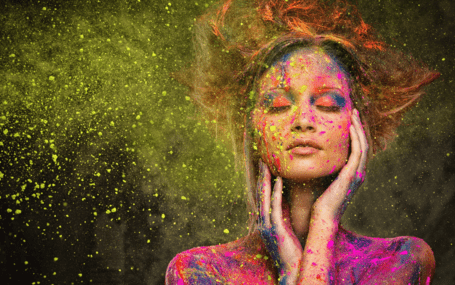Did you know that two of the first human diseases described by the classical Greek physicians are mania (mixture of anger, rage, and euphoria) and melancholia (sadness)? Jules Angst and Andreas Marneros wrote a paper that scoured ancient writings for observations about bipolar disorder. They found that review of pre-Hippocratic era manuscripts revealed descriptions of morbid states of depression and exaltation. In other words, super highs and super lows. Sound familiar?
Hippocrates (460-337 BC), known as the Father of Medicine (doctors still swear the Hippocratic oath), theorized that the brain was the organ in charge of mental functions, disturbances, and disorders. He wrote,
The people ought to know that the brain is the sole origin of pleasures and joys, laughter and jests, sadness and worry as well as dysphoria, and differentiate between feeling ashamed, good, bad, happy Through the brain we become insane, enraged, we develop anxiety and fears, which can come in the night or during the day, we suffer from sleeplessness, we make mistakes and have unfounded worries, we lose the ability to recognize reality, we become apathetic and we cannot participate in social life We suffer all those mentioned above through the brain when it is ill
I can absolutely relate to all of those feelings (sometimes all at once)!
To Socrates and Plato, mania was a divine state. In fact, Plato wrote that there are two kinds of mania, one that involves a mental strain that arises from a bodily cause of origin and the other is divine or inspired, with Apollo as the source of the inspiration. He went on to described several additional types of divine mania, including erotic inspiration sent by the god of love and protreptic inspiration that comes from Muses because it seems to inspire men to sing (or in my case, sketch, paint and write). While in manic episodes, I personally have experienced all of these divinely inspired states at one time or another.
The philosopher Democritus asked Hippocrates, Why are extraordinary men in philosophy, politics or the arts melancholics? After many discussions, Hippocrates concluded that Democritus did not suffer from melancholia he was simply a genius. Have you ever noticed how many people with bipolar disorder are artistic and/or geniuses (often referred to as divinely inspired)? I have found that I have had extreme bouts of creativity and productivity during manic episodes. And there are many, many famous creative geniuses who have also been diagnosed with bipolar disorder, including actors such as Mel Gibson, Carrie Fisher, Catherine Zeta-Jones and Vivien Leigh. Singer/songwriters Patty Duke and Nina Simone were diagnosed during their successful careers. Ted Turner, an extremely prosperous businessman, and the writer/novelist Ernest Hemingway were also treated for bipolar disorder. Some of recent historys influential thinkers and do-ers are thought by experts to have had bipolar disorder, including Jackson Pollack (artist), Friedrich Nietzsch (philosopher), Sir Isaac Newton (mathematician/physicist/philosopher), Abraham Lincoln (politician), Virginia Woolf (writer), Florence Nightingale (nurse) and Vincent van Gogh (artist), just to name a few.
While not a genius in any sense of the word, I like to consider myself divinely inspired from time to time. I have also noticed that, while I enjoy my creativity, my body and brain cannot maintain the manic pace for an extended period of time, and these episodes never happen without a depressive episode following closely on its heels (the higher the high, the lower the low). For me, finding the balance between the highs and lows is the sweet spot where I get the best work done without wanting to cut my ear off in the process (as one of our predecessors did). Working with my doctor, taking my meds, exercising, eating well, and having proper sleep habits give me the ability to use the divine gift for good.
I think the ancient Greeks were on to something we are divinely inspired. Lets celebrate, not that we have bipolar disorder, but just that we are part of an amazing club filled with artists, philosophers, writers and businessmen. I hope this inspires you to be the best that you can be. Not perfect, not a genius just a divinely inspired you.
Read the rest of Beka’s posts for IBPF here.


